If you have a high need for creativity, make certain you remain involved in the creative process as your company develops. You’ll want to shape your business so it’s not just an instrument for earning an income but also a means of maintaining your creative stimulation and making a larger contribution to society. But don’t overpersonalize your company, especially if it’s large. Allow room for others, particularly partners and key personnel, to share in the creative process.
If you need or want a great deal of control over your time, you’ll most likely need to keep your company smaller. In a large company, you’ll have less immediate control over many decisions.
If you’re a person who needs control, you can still grow your business larger. You’ll need to structure communication and reporting systems to ensure that you have sufficient information about and direction over developments to give you personal satisfaction. If you seek outside funding in the form of investors, understand the nature of the control your funders will have, and be certain you are comfortable with these arrangements.
If you have a high need for challenge in your business life, it’s important to develop positive means to meet this need, especially once your company is established and the initial challenge of starting a company is met. Otherwise, you may find yourself continually starting new projects that divert attention from your company’s overall goals. As you plan your company, establish personal goals that not only provide you with sufficient stimulation, but also advance—rather than distract from—the growth of your business. (Or take up sky diving on the side!)
Usually, control is the primary motivator for entrepreneurs. Control can mean the ability to make decisions, to directly influence the success of the company, or even to have the flexibility of choosing what hours and days to work. Others are motivated by the desire to create something new, whether art or software. My personal top motivator is “challenge,” so I’ve developed a business that is always exposing me to new industries and management problems. Otherwise, I’d be bored. Those who are only motivated by cash often fail.
Do You Have What It Takes?
The cover story of a major business magazine carried the headline: “Do you have what it takes to start a business?” In the story, grinning entrepreneurs answered that question: “You’ve got to have a maniacal mind-set;” “I don’t need an excessive amount of sleep;” “The odds are, most times, you fail.”
If being in business means you have to be an obsessive insomniac doomed to failure, then why are these people smiling?
The fact is, that magazine got it wrong: you don’t have to be a compulsive workaholic to start a business. Millions of entrepreneurs run successful enterprises, and, thankfully, they’re not all obsessed solely with business. Most businesspeople find time for many other aspects to their lives—family, community, hobbies, religion, sports.
The multitude of successful small businesses might not make it to the Top 10, or even Top 100, list of “best companies,” but those lists focus almost exclusively on financial factors.
But money is not what motivates most entrepreneurs. What do most small business owners care about?
You don’t need to be a compulsive workaholic to start a business.
In fact, that business magazine was out of touch with the reality of American entrepreneurship. Few entrepreneurs want to—or need to—be obsessive insomniacs to succeed in business. What successful owners of small companies have in common is that they’re motivated, self-directed, willing to take measured risks, determined, and optimistic.
If you have what it takes, you may not end up on the cover of a business magazine. But you
